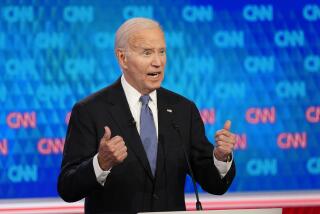Dole Pulls a Clinton: Forgive Me, Hollywood
WASHINGTON — I’ve noticed when Olympic divers fall behind on points, they revert to their best, most proven dive to get back into the medal race. Not wanting to miss the opportunity to make one last Olympic analogy, I offer Bob Dole’s Hollywood II speech last week as evidence that what’s good for high divers must be OK for politicians. Or at least that must have been the thinking in the Dole campaign.
If your campaign has taken as many hits as Dole’s, you can’t be blamed for revisiting the site of one of the few moments of triumph in the last year. Dole’s 1995 Hollywood I speech was clearly one of the best moments of his otherwise shaky campaign. He did what good politicians do: identify an enemy and then go into the belly of the beast and take it on, guaranteeing strong press coverage and high marks for courage. Dole hit a chord with the American people when he attacked Hollywood’s shameless reliance on sex and violence to sell tickets. That he was willing to go to Hollywood to say it in front of industry leaders gave his speech that much more resonance.
So when Dole’s campaign tipped off the press and pundits that Dole would go back for Hollywood II, some of us had the feeling, with great anticipation, that we were going to see a rematch of Muhammad Ali vs. Joe Frazier. Instead, it looked like a match between Mike Tyson and Frank Bruno. Of all things, Dole pulled a Bill Clinton.
True, he raised the obligatory warnings about gratuitous violence and casual sex, but, this time, Dole said he wanted to focus on “good movies in Hollywood.” So he proceeded to praise movies like “Independence Day,” which, unlike the movies he attacked in Hollywood I, he had actually seen, and to damn movies like “Striptease,” which his wife, Liddy, made sure he did not see. And so the reaction to Hollywood II was much like the reaction to any blockbuster sequel: Unless you exceed the expectations set up by the original, you are doomed to failure.
So, once again, the Dole campaign not only put their candidate in a dangerous position, but also allowed him to do what Clinton does so well--feel everyone’s pain. Remember when Clinton went to Houston and apologized to an audience of rich people for raising their taxes even though they would never vote for him, anyhow? Well, this was Dole’s equivalent. Very few people in Hollywood are going to vote for or support Dole, except for a few conservative voices like Bruce Willis, who probably won’t now since Dole dumped all over his wife’s movie.
And, of course, there was the question of why Dole seemed to reach his hand out to the film industry and not continue what most prudent political observers saw as a fight that was scoring points for him. It was left to William J. Bennett, Dole’s new sidekick and man of virtue, to provide the answer. “That first speech was a very touch speech,” said Bennett, who has garnered quite a reputation for taking on Hollywood. (Bill must want that vice-presidential nomination in the worst way.)
So Dole stumbled in Hollywood II, but the Democrats should not crow too loudly. The decline in morality in America is still one of the most potent social issues out there. The problem is, it’s a difficult issue for any politician to master, given the public’s cynicism toward politicians. Evidence the recent polls showing that a majority of voters think Clinton is morally bankrupt, yet still give him a 20-point lead over Dole, who they do not consider morally bankrupt. What does that say about the depth of cynicism in America or, more important, does it signal the sad realization that when it comes to politics and politicians, the public expects little in terms of morality?
There is still a possibility that Dole can regain the initiative and grab this issue for himself. After all, Clinton does have a character problem with the public, and although voters seem to be rejecting it as an issue now, when the Dole campaign is fully funded and goes on the attack with a series of television ads on Clinton’s character, the president might still be vulnerable. But there is no room in the campaign to seize the moral high ground as an issue if you are going to equivocate on the way.
Hollywood II had the potential to be a follow-up blockbuster for Dole with an opponent that the public thinks needs to be taught a lesson. But when Dole went face to face with the entertainment industry, he blinked. That, in itself, raises questions about Dole’s own integrity and whether he really does care about the moral decline in the entertainment industry or just sees it as a convenient way to grab headlines. Round III in San Diego may give us the answer.
More to Read
Go beyond the scoreboard
Get the latest on L.A.'s teams in the daily Sports Report newsletter.
You may occasionally receive promotional content from the Los Angeles Times.






